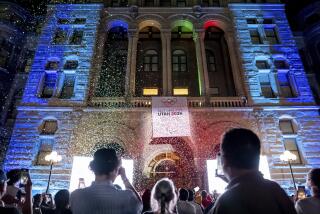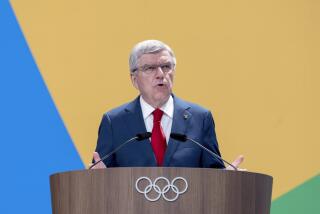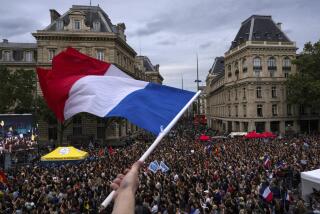‘A’ List of Sites Revealed
- Share via
LAUSANNE, Switzerland — In the most comprehensive report ever issued on the ability of cities wanting to organize the Olympics to really do it, the International Olympic Committee on Tuesday boosted the bids of Beijing, Paris and Toronto for the 2008 Summer Games and essentially doomed Istanbul, Turkey and Osaka, Japan.
The evaluation, which concentrated on the cities’ technical merits and did not address political concerns, such as human rights, confirmed Beijing’s long-standing status as front-runner while significantly enhancing ambitions in Paris and Toronto. All three were deemed capable of organizing “excellent” Games. They were not ranked.
The IOC’s Evaluation Commission, an in-house panel formed to assess bids in the wake of the 1999 Salt Lake City corruption scandal, said that Istanbul and Osaka presented unacceptable risks, primarily financial. In the fallout of the scandal, the IOC banned members from visiting bidding cities, ordering them instead to rely on the cities’ formal bid books and on the report issued Tuesday.
“Deeply gratified,” Wang Wei, secretary general of the Beijing bid, said after reviewing the report. Cautioned Liu Jingmin, another bid executive, “We have a long way to go.”
Paris and Toronto bid executives, professed similar humility, nonetheless were all smiles.
Meantime, in a vivid demonstration of how the game is played, Beijing’s bid officials signaled immediately after the report was issued that they are now willing to make accommodations on a key point--the proposal to play beach volleyball at Tiananmen Square, site of the infamous 1989 massacre by Chinese troops. The bid team said another site is already under consideration.
The 2008 site will be selected July 13 at an IOC all-delegates session in Moscow. At that same meeting, only three days later, the IOC also will elect a new president. Juan Antonio Samaranch will step down in July after 21 years atop the IOC, and the politicking by the five presidential contenders fully matches that of the campaign for the 2008 site.
Anita DeFrantz of Los Angeles showed up here obviously having been on a diet--the better to be ever-so-telegenic in Moscow. So did Dick Pound of Canada, who said he’d lost 20 pounds. South Korea’s Kim Un Yong spent the better part of Monday night in the bar at the Palace Hotel, the IOC’s after-hours stronghold, laying on the charm for reporters, most of them American. Kim had avoided the bar for months in the wake of the Salt Lake scandal, in which he received a “most serious” warning.
Also seen in the bar: Pal Schmitt of Hungary, another presidential contender.
Jacques Rogge of Belgium, considered one of the strongest candidates, did not arrive in time Monday to make the rounds.
The specter of an all-knowing ethics police, however, has infiltrated virtually every facet of IOC life. The Toronto bid committee--which had planned a mixer for another hotel Monday afternoon--abruptly canceled it for fear of a violation.
The mixer still happened--just not under the formal aegis of the Toronto 2008 bid committee.
“This is not an event,” one Toronto staffer declared.
Looking around at three dozen people in the crowded bar of the Beau Rivage Hotel, he shook his head, laughed and remarked on the absurdity of the situation, “This is like a ‘Saturday Night Live’ skit.”
The scandal still shadows the IOC--and probably will, Olympic insiders concede, until the new president takes over and until the Salt Lake Games, to be held next February, conclude.
The IOC announced Tuesday that its quasi-independent Ethics Commission will undertake yet another investigation relating to Salt Lake’s winning bid in 1995 for the 2002 Games. This one, the IOC said, stems from a press clipping read by Francois Werner, the commission’s recently appointed staff inspector, and involves the conduct of someone in the wide-ranging “Olympic family,” but not an IOC member or a member’s relative. He provided no other details.
The IOC also said Tuesday it intends to set up the Ethics Commission as a separately funded foundation--to better establish its independent nature, IOC Director General Francois Carrard said. The IOC intends to supply a starting grant of $2.5 million.
The IOC also announced that it had suspended Mohamad “Bob” Hasan of Indonesia, recently convicted of corruption charges in Jakarta and sentenced to six years behind bars. He will probably face expulsion in July in Moscow.
The selection of the 2008 site, a decision that will be made the first day of the Moscow session, holds considerable implications for Los Angeles and the seven other U.S. cities already in the running for the 2012 Summer Games.
If Beijing or Paris wins for 2008, most Olympic insiders believe that makes it more likely the IOC will consider returning to the United States in 2012. If Toronto wins in 2008, that all but eliminates the U.S. for 2012. If Toronto loses in 2008, however, officials there have already indicated an interest in vying again for the 2012 Games.
The 14-member Evaluation Commission, chaired by Hein Verbruggen, head of the international cycling federation, concluded that the Toronto, Paris and Beijing bids had only “minor deficiencies” that could “be resolved” before 2008. The commission visited each of the five cities on trips in February and March.
The municipal government of Osaka, the report said, might find itself on the hook for $28 billion to stage the Games. Not an acceptable risk, Verbruggen said. Afterward, Osaka bid executives protested that the commission had erred in its calculations.
In Turkey, a unique law would provide Olympic financing for Istanbul, the report said. But “blanket assurances” under the law make it “difficult to analyze figures” and differentiate who would be responsible for paying what, the report said.
Two Olympic insiders said late Tuesday that the IOC’s policy-making Executive Board may now consider, perhaps as soon as today, whether it has unilateral authority to eliminate Osaka and Istanbul from the race before July.
The report tweaks the Toronto bid for what it calls “a large element of private-sector investment.” The Sydney Games last year were largely a government production, and the IOC is increasingly comfortable with such a financing model.
The province of Ontario--equivalent to a state government in the U.S.--has offered “substantial guarantees” to clear any “operational shortfall,” the report notes, and Ontario Premier Mike Harris flew to Lausanne to say the Games would be “delivered on budget.”
With only two months until the vote, the French--apparently confident before the release of the report that their position would be solidified--have finally begun taking aim at the Chinese.
In a clear reference to human rights, Claude Bebear, the Paris bid chief, said in an interview Monday in the French capital, “How can you [reconcile] the Olympic charter, what is said in the Olympic charter, with what is happening in China?”
Declaring that he was merely “saying what some members are thinking more and more,” he added, “Is it safe to give the Games to Beijing? Nobody knows what could happen in the next eight years in China. Everybody knows the Games in Athens [in 2004] are not going to be easy.” To go to Paris--or Toronto or Osaka, he said--would be “very safe.”
The human-rights issue played a key role in Beijing’s losing the 2000 Games to Sydney. That vote was taken in 1993, four years after Chinese troops had fired on student protesters and other activists in Tiananmen Square.
About three dozen protesters took up positions Tuesday in a steady rain outside the IOC’s headquarters. Armed Swiss policemen stood watch as the protesters shouted, “No human rights! No Olympics!”
In a sign that the Chinese are determined not to let the human-rights issue block their bid once more, bid officials were quick to give ground when the Evaluation Commission pointed out that Tiananmen Square, the proposed beach volleyball venue, was “inappropriate.”
The bid committee had already proposed an alternative, in a city park, the report noted. And Wang said, “The venue in Tiananmen Square does have some inconveniences.” Transport to the site, he said, “is not very good.”
More to Read
Go beyond the scoreboard
Get the latest on L.A.'s teams in the daily Sports Report newsletter.
You may occasionally receive promotional content from the Los Angeles Times.






